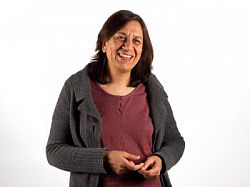IWD 2016: Maya Unnithan - Anthropology is face-to-face interaction; that’s how knowledge is created
Maya Unnithan, Professor of Social and Medical Anthropology, is director of the Centre for Cultures of Reproduction, Technologies and Health (CORTH) which she helped establish in the School of Global Studies and has served on the World Health Organisation’s steering committee on the impact of rights on maternal and child health.
 Professor Maya Unnithan
Professor Maya Unnithan
If your parents come from different backgrounds you are already thinking about cultural differences. I grew up in Rajasthan in India. My father Is Indian – from Kerala – but my mother is Dutch so I felt both Indian and Dutch.
I took a degree in economics – and found it so dry. It was supposed to be about humans, but where were the people? My parents were both highly educated – they met at the Institute of Social Studies in Holland where my father was doing research on Gandhi – and they encouraged me to study and to do whatever I wanted. Although I was from a privileged background, I was interested in inequality and poverty.
Anthropology is face-to-face interaction. That’s how knowledge is created. It’s immediate. I went to Cambridge and did anthropology for my PhD because I wanted to understand what was happening within cultures.
I went back to Rajasthan and spent a year living in a remote rural community. I had seen the women from these communities coming to the town every day and had always been fascinated by them. They lived in harsh, barren environments and walked 20kms every day to sell firewood.
There were several moments when I felt in danger. I remember on the first day we were cooking food and a dog started barking and I looked round and saw a cobra. We were four hours walk from anywhere and I thought I was going to die. That’s when I started thinking about the precariousness of their lives.
Every society has something to say about nature and biology, but even biology is culturally constructed. That’s why I was involved in setting up CORTH (Centre for Cultures of Reproduction, Technologies and Health) here at Sussex, which looks at issues such childbearing and maternal health and sexual and reproductive health rights and justice.
There’s very little talk about infertility in India. One of the areas I have been looking at is birth and midwifery but also what it means to be infertile in India. A lot of infertility is caused by poor healthcare, yet these issues are not addressed by the healthcare providers. CORTH aims to bridge the gap between healthcare policy and the receivers of that healthcare.
Whether you observe or whether you help is a major dilemma for anthropologists, especially if you work within poor communities. But the primary purpose of an anthropologist is to understand a people and to see how they frame their lives and make meanings of things.
It excites me how we can help people see these different worlds. It could be about looking at an issue such as having a baby – something that happens everywhere in the world – and understanding what it means to a particular relationship, community and country. It’s about the very local and the global at the same time.
